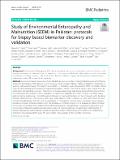| dc.contributor.author | Yilmaz, Omer H. | |
| dc.date.accessioned | 2020-04-14T12:09:03Z | |
| dc.date.available | 2020-04-14T12:09:03Z | |
| dc.date.issued | 2019-07-22 | |
| dc.identifier.issn | 1471-2431 | |
| dc.identifier.uri | https://hdl.handle.net/1721.1/124606 | |
| dc.description.abstract | Background: Environmental Enteropathy (EE), characterized by alterations in intestinal structure, function, and immune activation, is believed to be an important contributor to childhood undernutrition and its associated morbidities, including stunting. Half of all global deaths in children < 5 years are attributable to under-nutrition, making the study of EE an area of critical priority. Methods: Community based intervention study, divided into two sub-studies, 1) Longitudinal analyses and 2) Biopsy studies for identification of EE features via omics analyses. Birth cohorts in Matiari, Pakistan established: moderately or severely malnourished (weight for height Z score (WHZ) < - 2) children, and well-nourished (WHZ > 0) children. Blood, urine, and fecal samples, for evaluation of potential biomarkers, will be collected at various time points from all participants (longitudinal analyses). Participants will receive appropriate educational and nutritional interventions; non-responders will undergo further evaluation to determine eligibility for further workup, including upper gastrointestinal endoscopy. Histopathological changes in duodenal biopsies will be compared with duodenal biopsies obtained from USA controls who have celiac disease, Crohn's disease, or who were found to have normal histopathology. RNA-Seq will be employed to characterize mucosal gene expression across groups. Duodenal biopsies, luminal aspirates from the duodenum, and fecal samples will be analyzed to define microbial community composition (omic analyses). The relationship between histopathology, mucosal gene expression, and community configuration will be assessed using a variety of bioinformatic tools to gain better understanding of disease pathogenesis and to identify mechanism-based biomarkers. Ethical review committees at all collaborating institutions have approved this study. All results will be made available to the scientific community. Discussion: Operational and ethical constraints for safely obtaining intestinal biopsies from children in resource-poor settings have led to a paucity of human tissue-based investigations to understand and reverse EE in vulnerable populations. Furthermore, EE biomarkers have rarely been correlated with gold standard histopathological confirmation. The Study of Environmental Enteropathy and Malnutrition (SEEM) is designed to better understand the pathophysiology, predictors, biomarkers, and potential management strategies of EE to inform strategies to eradicate this debilitating pathology and accelerate progress towards the 2030 Sustainable Development Goals. Trial registration: Retrospectively registered; clinicaltrials.gov ID NCT03588013. | en_US |
| dc.description.sponsorship | Bill & Melinda Gates Foundation (Grant AA:OPP1138727) | en_US |
| dc.description.sponsorship | Bill & Melinda Gates Foundation (Grant SRM: OPP1144149 U19 AI116491 t) | en_US |
| dc.description.sponsorship | Bill & Melinda Gates Foundation (Grant JG: OPP1136751) | en_US |
| dc.description.sponsorship | National Institutes of Health (U.S.) (Grant NTI: TW010697–01) | en_US |
| dc.language.iso | en | |
| dc.publisher | Springer Science and Business Media LLC | en_US |
| dc.relation.isversionof | 10.1186/s12887-019-1564-x | en_US |
| dc.rights | Creative Commons Attribution 4.0 International license | en_US |
| dc.rights.uri | https://creativecommons.org/licenses/by/4.0/ | en_US |
| dc.source | BioMed Central (BMC) | en_US |
| dc.subject | Pediatrics, Perinatology, and Child Health | en_US |
| dc.title | Study of Environmental Enteropathy and Malnutrition (SEEM) in Pakistan: protocols for biopsy based biomarker discovery and validation | en_US |
| dc.type | Article | en_US |
| dc.identifier.citation | Iqbal, Najeeha T. et al. "Study of Environmental Enteropathy and Malnutrition (SEEM) in Pakistan: protocols for biopsy based biomarker discovery and validation." BMC pediatrics 19 (2019): 247 © 2019 The Author(s) | en_US |
| dc.contributor.department | Massachusetts Institute of Technology. Department of Biology | en_US |
| dc.contributor.department | Koch Institute for Integrative Cancer Research at MIT | en_US |
| dc.relation.journal | BMC pediatrics | en_US |
| dc.eprint.version | Final published version | en_US |
| dc.type.uri | http://purl.org/eprint/type/JournalArticle | en_US |
| eprint.status | http://purl.org/eprint/status/PeerReviewed | en_US |
| dc.date.updated | 2020-02-04T18:52:36Z | |
| dspace.date.submission | 2020-02-04T18:52:38Z | |
| mit.journal.volume | 19 | en_US |
| mit.journal.issue | 1 | en_US |
| mit.license | PUBLISHER_CC | |
| mit.metadata.status | Complete | |
